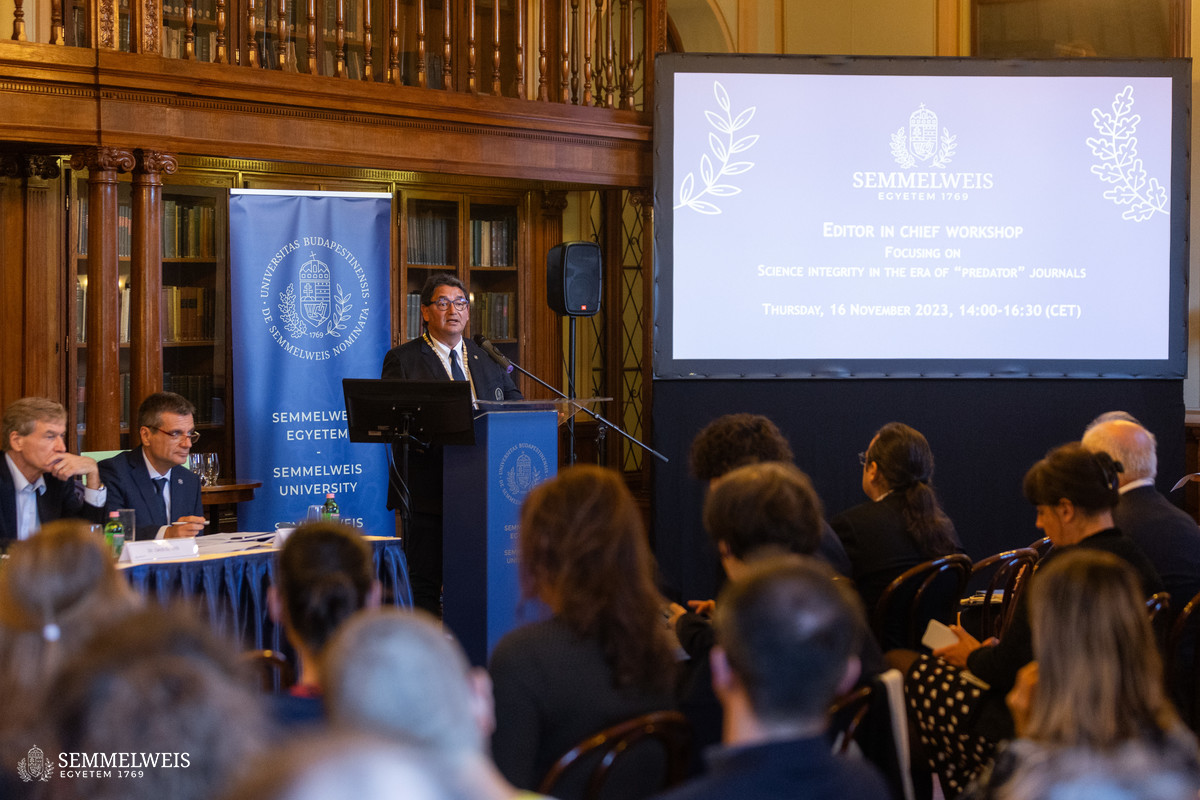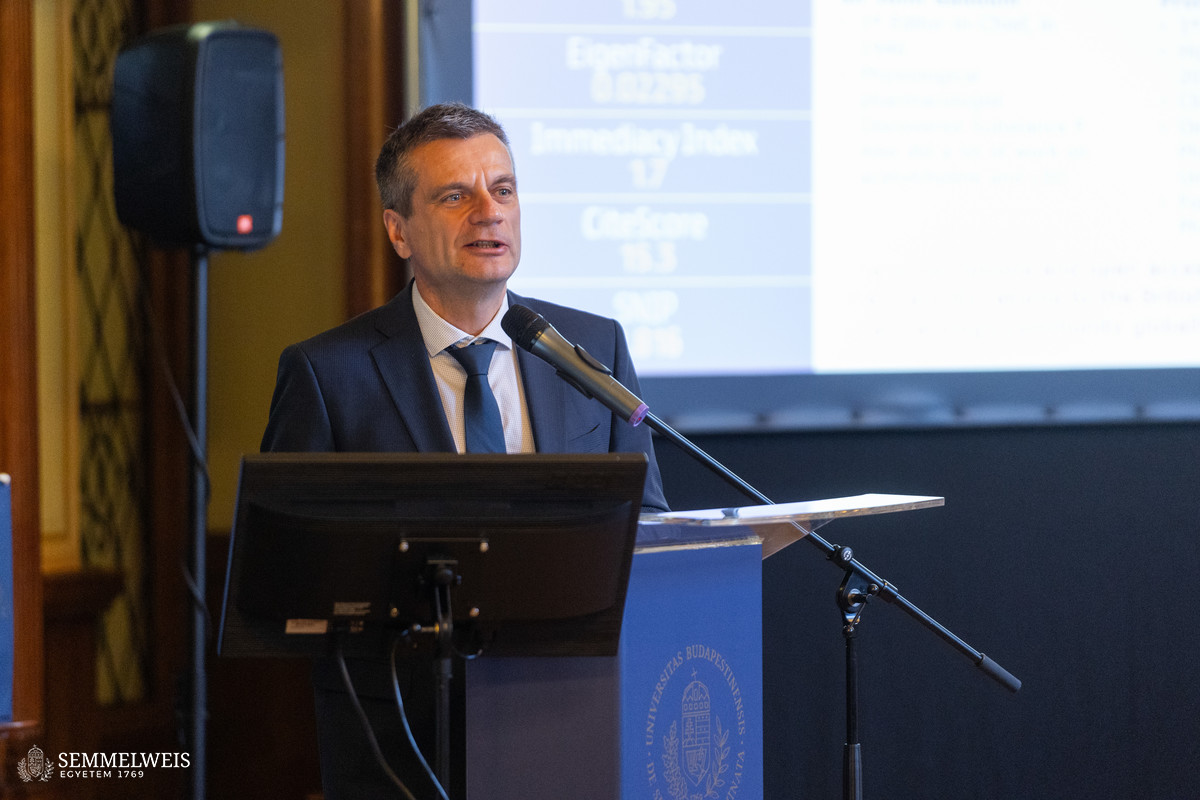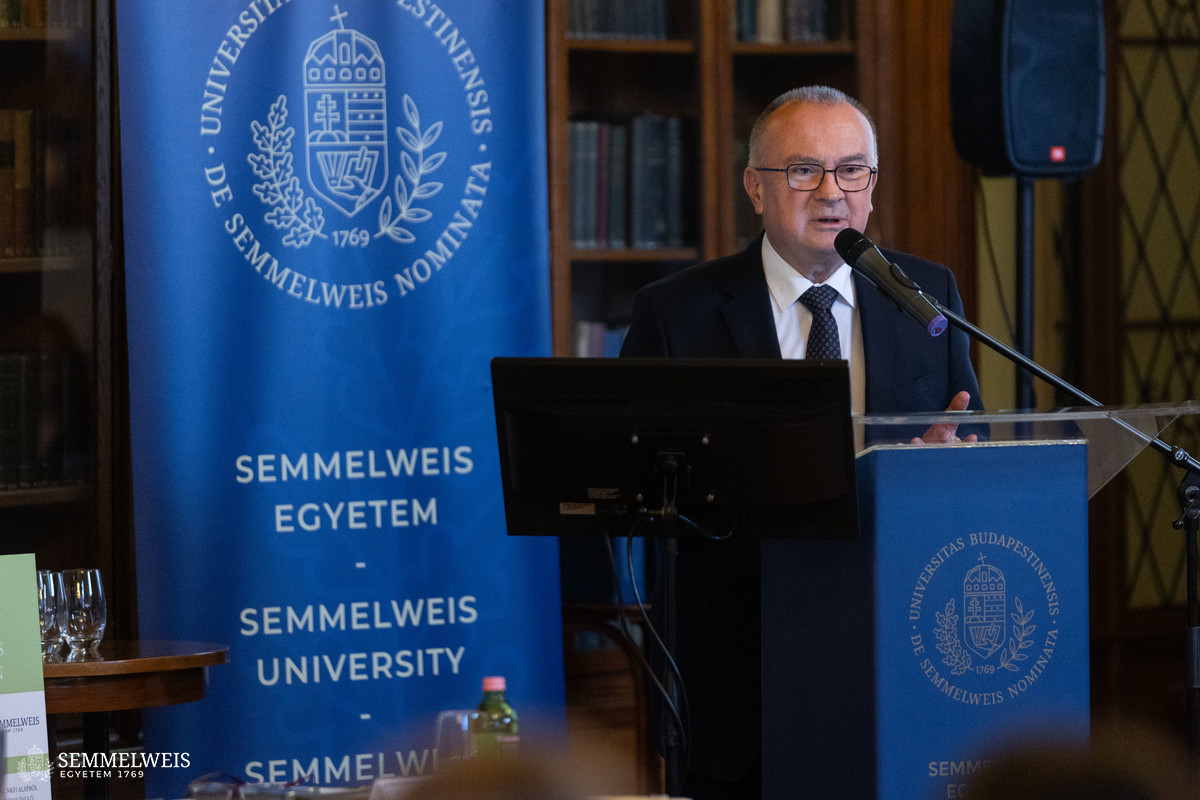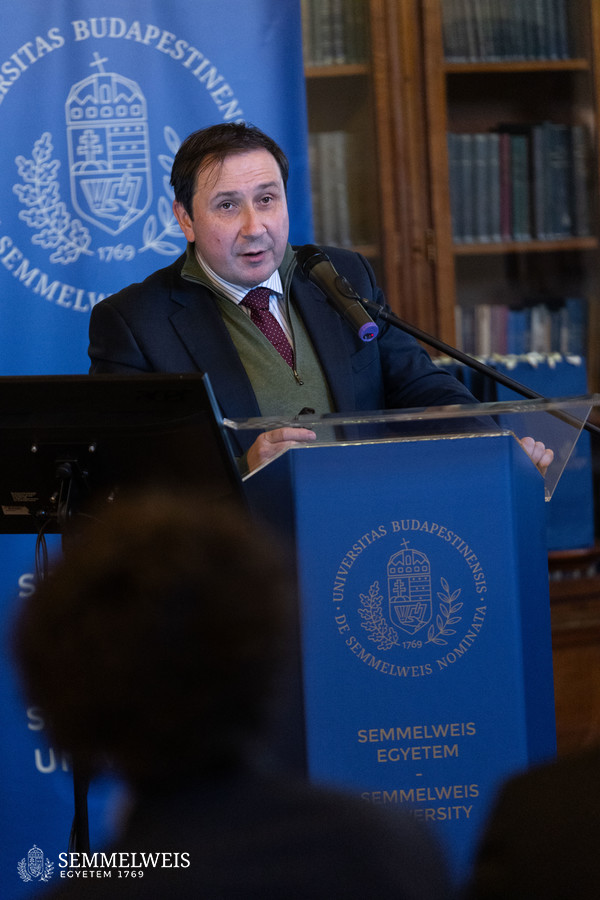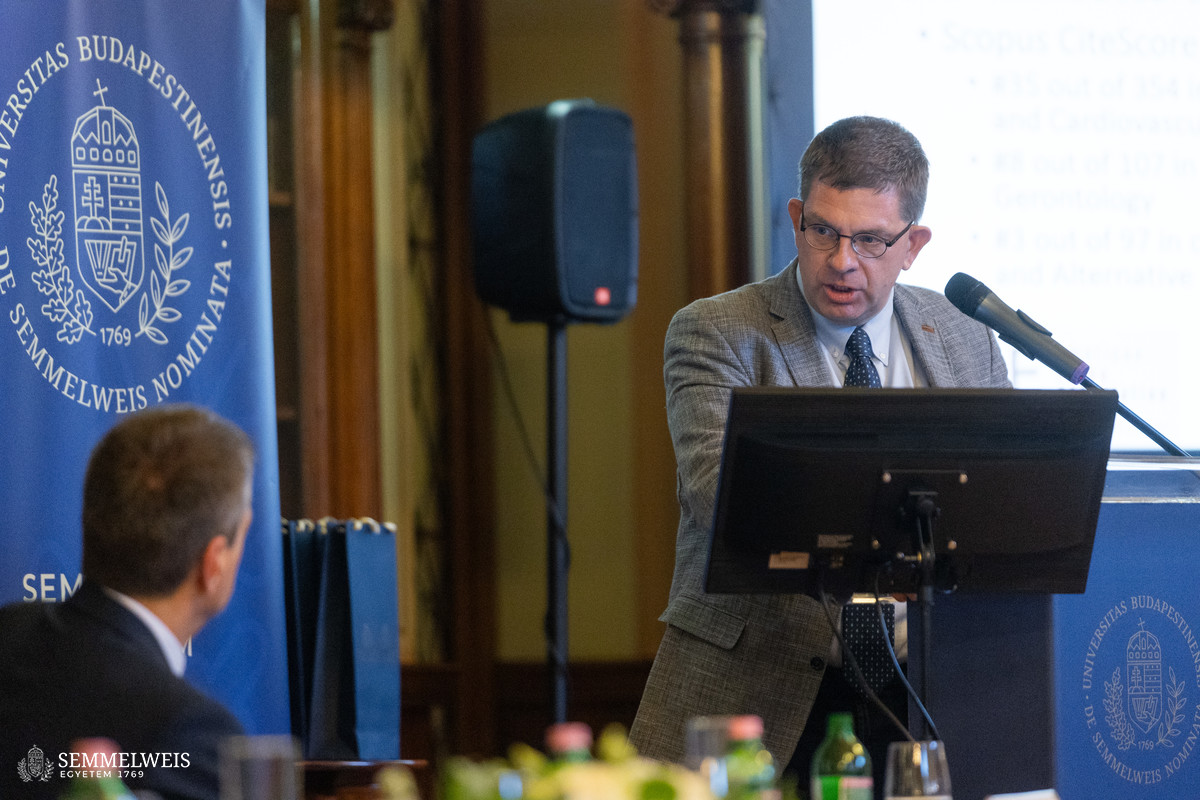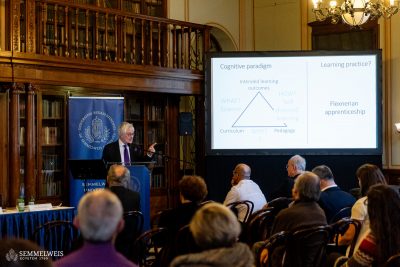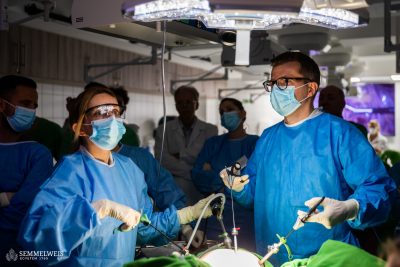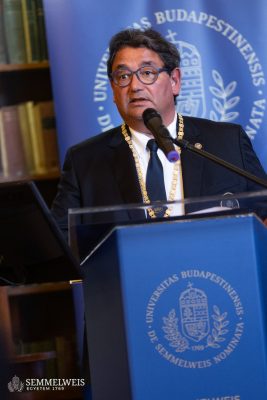 Opening the lecture series, Dr. Béla Merkely, Rector of Semmelweis University, said in his welcome speech that the event will primarily involve the exchange of ideas with domestic and international editors-in-chief of journals on cardiology and pharmacology, researchers, and experts in the field of research, development and innovation. According to the Rector, Semmelweis University does everything to ensure that the studies of its researchers are published in prestigious, high-quality journals whose editorial boards include internationally recognized experts in the field of science. Dr. Béla Merkely also highlighted that the university wishes to provide assistance so that the university’s researchers can avoid publication in predatory journals. “In addition to building relationships, today’s meeting also serves this purpose – by sharing experiences, methods, and techniques,” he said in his speech.
Opening the lecture series, Dr. Béla Merkely, Rector of Semmelweis University, said in his welcome speech that the event will primarily involve the exchange of ideas with domestic and international editors-in-chief of journals on cardiology and pharmacology, researchers, and experts in the field of research, development and innovation. According to the Rector, Semmelweis University does everything to ensure that the studies of its researchers are published in prestigious, high-quality journals whose editorial boards include internationally recognized experts in the field of science. Dr. Béla Merkely also highlighted that the university wishes to provide assistance so that the university’s researchers can avoid publication in predatory journals. “In addition to building relationships, today’s meeting also serves this purpose – by sharing experiences, methods, and techniques,” he said in his speech.
Protecting the prestige of the scientific world is also of outstanding importance for the researchers of Semmelweis University, the international reputation of our institution also obliges us to do so – and this ultimately serves the development and progress of the Hungarian scientific life. I am proud that Semmelweis University is taking a flagship role in this process, and I am confident that our exchange of ideas will be fruitful,
— Dr. Béla Merkely concluded his thoughts. Dr. Péter Ferdinandy, Vice Rector for Science and Innovations at Semmelweis University and Editor-in-Chief of the British Journal of Pharmacology, highlighted in his presentation that he considers it important to reduce the administrative burden of researchers submitting papers as much as possible, and that communication related to the evaluation process should be efficient, simple and fast, so that the researchers can focus on high scientific quality.
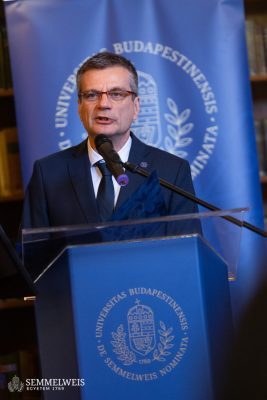 Concluding his presentation, the Vice Rector pointed out that the issue of academic integrity is facing a growing problem. From 2023, the journal he edits has an editor responsible for the integrity of science, whose task is to filter out fake studies, and the publisher of the journal also has a team specialized in this. In addition, all editors are responsible for quality control. He added that while they launched 16 investigations in 2022 and found not a single problematic material, in 2023 they had to withdraw one of the 11 studies under scrutiny from publication, and three others were also found to be questionable. This also indicates the increasing spread of the problem, even in the case of a journal that applies such strict rules and is professionally reliable.
Concluding his presentation, the Vice Rector pointed out that the issue of academic integrity is facing a growing problem. From 2023, the journal he edits has an editor responsible for the integrity of science, whose task is to filter out fake studies, and the publisher of the journal also has a team specialized in this. In addition, all editors are responsible for quality control. He added that while they launched 16 investigations in 2022 and found not a single problematic material, in 2023 they had to withdraw one of the 11 studies under scrutiny from publication, and three others were also found to be questionable. This also indicates the increasing spread of the problem, even in the case of a journal that applies such strict rules and is professionally reliable.
Dr. Gerd Heusch, associate of the Essen University Hospital and editor of Basic Research in Cardiology, gave a presentation on the problem of reproducibility of preclinical cardioprotective research and studies. In his presentation, he emphasized that some predatory journals are particularly widespread in various scientific fields. He said that in a publication in the Far East, the journal he edited was cited as a source, even though the study had nothing to do with cardiology, instead it featured botanical and engineering subtopics. According to Dr. Gerd Heusch, this may have happened because a study by an author was published in the journal Basic Research and Cardiology, and this researcher wanted to increase his citation rate in a journal of dubious scientific value, to which the predatory journal actively contributed.
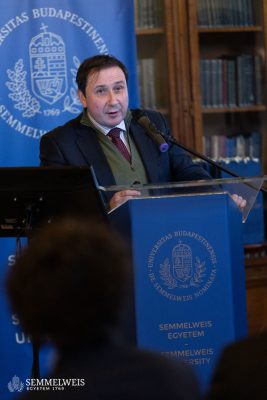 Dr. Robert Hatala, Editor-in-Chief of the European Heart Journal and representative of the National Institute of Cardiovascular Diseases in Bratislava, spoke about integrity in relation to the medical academic career. He said that medicine has atomized into subfields, making it very difficult to oversee each field. This also makes it difficult to assess and evaluate clinical excellence and can lead to integrity issues. According to him, there are not only predatory publications, but also predatory conferences. “Academic, clinical, and teaching excellence should be considered the highest virtue of personal integrity in academic life,” he stated.
Dr. Robert Hatala, Editor-in-Chief of the European Heart Journal and representative of the National Institute of Cardiovascular Diseases in Bratislava, spoke about integrity in relation to the medical academic career. He said that medicine has atomized into subfields, making it very difficult to oversee each field. This also makes it difficult to assess and evaluate clinical excellence and can lead to integrity issues. According to him, there are not only predatory publications, but also predatory conferences. “Academic, clinical, and teaching excellence should be considered the highest virtue of personal integrity in academic life,” he stated.
Dr. Tomasz Guzik, Editor-in-Chief of Cardiovascular Research and associate of the University of Edinburgh and Krakow, argued in favor of “open science” because, according to him, it is the only way to achieve research integrity. He said that only a small part of published publications is really significant, but in order for science to be effective, the possibility of publishing should potentially be made available to everyone – therefore, journals should also use an active social media presence – which, on the other hand, is not the same as free by publication. He also said that there are countries particularly affected by predatory behavior, whose journals deliberately look for opportunities for abuse.
Next came Dr. Zoltán Ungvári from Semmelweis University, Editor-in-Chief of GeroScience, who drew attention to the fact that in many cases a predatory journal can even have a significant impact index, which raises further questions and problems.
Dr. Roland Steifert joined the conference online from the Hannover Medical School, who is the Editor-in-Chief of Naunyn-Schmiedeberg’s Archives of Pharmacology (NSAP). He discussed how the studies published by the NSAP were analyzed. They also found some fake studies, which are mostly almost identical to articles listed elsewhere, but with different authors. According to him, such materials typically come from the Far East, but Middle Eastern countries are also affected. He pointed out that many universities encourage their students and researchers to publish such large number of publications that is already at the expense of quality. This is also a harmful, predatory phenomenon.
In the second half of the event, representatives of pharmaceutical and other journals presented their position on the issue, including Dr. Michael F. Jarvis from the University of Illinois-Chicago, who is the Editor-in-Chief of Pharmacology Research and Perspectives and Dr. Beáta Dávid on behalf of the European Journal of Mental Health.
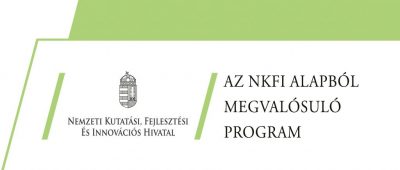 Mária Sánta
Mária Sánta
Photo: Attila Kovács — Semmelweis University
